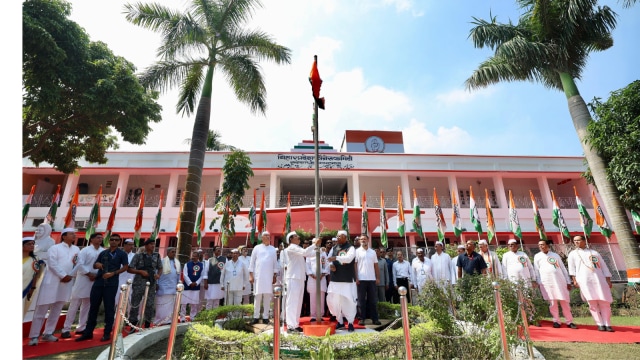
At a meeting of the Congress Working Committee (CWC) in Bihar, held in the state for the first time since 1940, Rahul Gandhi sent a subtle message to ally RJD, telling leaders at a closed-door session that there would be no compromise on the ideology and self-respect of workers with seat-sharing talks for the coming Assembly elections around the corner. The CWC resolution which followed the meeting also made no mention of the Mahagathbandhan.
Later, though, the Mahagathbandhan together made an outreach to the Extremely Backward Classes (EBCs), which have been the mainstay of JD(U) supremo Nitish Kumar’s politics for two decades. The alliance released a 10-point ‘Atipichhda Nyay Sankalp’, promising several benefits to the EBCs.
One of the major promises of the EBC ‘Sankalp’, released jointly by Gandhi and Tejashwi, was the passage of an ‘EBC Atrocities Prevention Act’, on the lines of the SC/ST Act, to “end discrimination and violence against them”. It also proposed enhancing reservation for EBC communities from 20% to 30% in panchayats and municipal bodies, separate quota for them in educational institutions and government contracts, and constituting a committee to review caste lists for “under-inclusion” and “over-inclusion”.
In its resolution, the CWC recalled that the Congress had “played a pivotal role in shaping Bihar’s industrial, infrastructural, and social landscape”, mentioning projects like Asia’s largest rail yard at Garhara, India’s first fertilizer factory at Sindri, and the Damodar Valley Project, among others.
Equally revolutionary, it said, were the Congress’s efforts towards advancing social justice and education. “The abolition of the zamindari system under the leadership of Shri Krishna Sinha was one of the most important steps in advancing democracy and equality in Bihar. The contributions of Babu Jagjivan Ram, the longest serving Union minister in the history of Independent India, can never be forgotten. Leaders such as Bhola Paswan Shastri and Sumitra Devi championed the rights of marginalized communities,” it said, mentioning the establishment of premier institutions like the Indira Gandhi Institute of Medical Sciences, Nalanda Medical College, and Magadh University.
The CWC added that this journey of Bihar led by the Congress “towards becoming a prosperous, fully democratic and egalitarian society” was under threat.
Mentioning Gandhi’s recent Voter Adhikar Yatra in Bihar, in which he was joined by Tejashwi, the CWC attacked Nitish for his “broken promises and betrayals”.
The balancing act by the Congress Tuesday, underlining a separate identity for itself, comes days after it said that the party should not be saddled with “bad” or difficult to win constituencies in the seat-sharing. It has also been saying that all existing Mahagathbandhan constituents should contribute from their “kitty” to accommodate new partners.
The EBC push is understandable given that at 36% of the population, they form a sizeable chunk. They have been Nitish voters for several years now, due to both the CM’s welfare schemes for them and the perceived pro-Yadav tilt of the RJD. However, as per Mahagathbandhan sources, the EBC support base of Nitish, who is not in the best of health, is splintering now.
In a significant move in June, the RJD appointed veteran socialist leader and ex-MP Mangani Lal Mandal, an EBC, as its Bihar president. Mandal belongs to the Dhanuk community which, along with Nonias, Telis and Mallahs, forms a key part of the EBC vote base in Bihar.
For the Congress too, which has been pursuing a social justice agenda for some time, the EBC outreach is in line with its demand for a caste census and promise to raise the 50% reservation ceiling. The Sankalp released Wednesday also talked of land grants to EBCs, along with other backward groups.
Gandhi said: “During the 15-day Voter Adhikar Yatra, we travelled through Bihar explaining that the Constitution is under attack. Our response is this resolution. It is a promise of legislative reform, education, employment, and dignity for the most marginalised sections of society.”
The CWC resolution raised the issue of “vote chori” under the Modi government and questioned the timing of the Special Intensive Revision (SIR) to review poll rolls in Bihar. It also attacked India’s foreign policy on China and the US.
Linking its vote chori campaign to bread and butter issues, the resolution said: “A government built on stolen mandates and rigged voter lists has no moral or political legitimacy… In the absence of democratic accountability, the government is freed of any obligation to care about unemployment, farmer suicides, inflation, crumbling healthcare, ruined education and collapsing infrastructure. The government is apathetic because it knows it can remain in power not through service but through deceit and fear.”
Referring to Gandhi’s recent Bihar Yatra, the resolution said it showed the Congress’s “firm pledge… (to) never give up its fight for those who have been oppressed and marginalised by the BJP”, and praised the Congress leader.